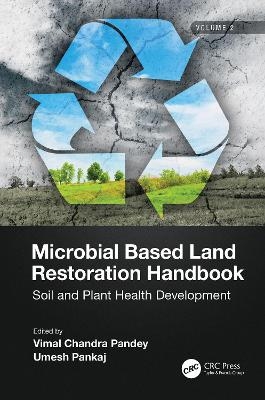
Microbial Based Land Restoration Handbook, Volume 2
CRC Press (Verlag)
978-0-367-70224-3 (ISBN)
Microorganisms are a good indicator of soil health. Plant growth-promoting microorganisms protect plants from the stresses of water, salt, metal, biotic, and so on, and are well known for strategically modulating the plant mechanisms to defend and mitigate environmental stresses. Taking a multidisciplinary approach, this volume explores the role of plant microorganisms in ecological and agricultural revitalization beyond normal agriculture practices and offers practical and applied solutions for the restoration of degraded lands to fulfill human needs with food, fodder, fuel, and fiber. It also provides a single comprehensive platform for soil scientists, agriculture specialists, ecologists, and those in related disciplines.
Features
• Presents cutting-edge microbial biotechnology as a tool for restoring degraded lands
• Explores the aspects of sustainable development of degraded lands using microorganism-inspired land remediation
• Highlights sustainable food production intensification in nutrient-poor lands through innovative use of microbial inoculants
• Explains the remediation of polluted land for regaining biodiversity and achieving United Nations Sustainable Development Goals
• Includes many real-life applications from South Asia offering solutions to today’s agricultural problems
This book will be of interest to professionals, researchers, and students in environmental, soil, and agricultural sciences as well as stakeholders, policy makers, and practitioners with an interest in this field.
Dr. Vimal Chandra Pandey is internationally recognized in the field of Phyto management of polluted sites. Dr. Pandey is a CSIR-Pool Scientist at the Department of Environmental Science, Babasaheb Bhimrao Ambedkar University, Lucknow, India. He also works as a Consultant at CSTUP and DST-Young Scientist at the Plant Ecology and Environmental Science Division, CSIR-National Botanical Research Institute, Lucknow, India. He is a recipient of a number of awards, honors, and fellowships such as CSTUP-Young Scientist award, DST SERB-Young scientist award, UGC-Dr. DS Kothari Postdoctoral Fellowship. He is a Member of IUCN-CEM Ecosystem Restoration, Agro-ecosystems, South Asia, and a member of the BECT’s Editorial Board. He has published more than 52 peer-reviewed articles and 37 book chapters. He is the author and editor of four books published by Elsevier. His high-quality research papers have good citations and have been cited worldwide by researchers within a short period of time. He is also serving as a potential reviewer for several journals from Elsevier, Springer, Wiley, Taylor & Francis etc. Dr. Umesh Pankaj is a Teaching and Research Associate in the Microbiology Department at Rani Lakshmi Bai Central Agricultural University, Jhansi, India. His doctoral degree in Microbiology was awarded from Jawaharlal Nehru University, New Delhi. His area of research is mainly focused on the phytoremediation of salt-affected soil using halotolerant Bio-inoculants like PGPRs and Arbuscular Mycorrhiza Fungi. Currently, he is working on Biofertilizers used for sustainable development. He has published 11 research articles in peer reviewed international journals and 5 book chapters. He has received Young Microbiologist Award from Agro-Environmental Development Society, Uttar Pradesh and Best Poster Award from ICAR-Indian Institute of Sugarcane Research, India. He is a life member of various scientific societies.
Chapter 1. Role of Soil Microorganisms in Sustainable Crop Production, Chapter 2. Microbial Mediated Molecular Mechanisms to Cope-up Salinity and Drought Stress in Plants , Chapter 3. Role of Arbuscular Mycorrhizal Fungi in Horticultural Crops: Gains and Provocations, Chapter 4. Endophytes and Their Role in Managing Degraded Land and Enhancing Food, Fodder, Fuel and Fiber Production , Chapter 5. Microbial Strategies for Improving the Food Crop Productivity Under Salinity and Drought, Chapter 6. Secondary Metabolites: Stress Busters for the Development of Resilience in Plants to Sustainable Agriculture, Chapter 7. Bacillus-based Biocontrol: Practical Applications for Sustainable Agriculture, Chapter 8. Recognizing Insight Interaction, Adaptation & Potentialities of Phyllosphere Microbiome Under Various Distress Towards Sustainable Plant Growth, Chapter 9. Importance of Bio-fertilizers in Turmeric (Curcuma Longa): Prospects and Challenges, Chapter 10. Role of Soil Organisms in Maintaining Soil Health, Chapter 11. Recent Advances in Potentiality of Microbes in Promoting Plant Growth and Managing Degraded Land , Chapter 12. Productivity Losses Through Bio-deterioration in Water Deficit Harvested Sugarcane, Chapter 13. Bio-inoculants: the Potential Microbes for Restoration of Degraded Soil
| Erscheinungsdatum | 21.11.2022 |
|---|---|
| Zusatzinfo | 25 Tables, black and white; 12 Line drawings, black and white; 9 Halftones, black and white; 21 Illustrations, black and white |
| Verlagsort | London |
| Sprache | englisch |
| Maße | 156 x 234 mm |
| Gewicht | 600 g |
| Themenwelt | Naturwissenschaften ► Biologie ► Botanik |
| Naturwissenschaften ► Biologie ► Ökologie / Naturschutz | |
| Naturwissenschaften ► Geowissenschaften ► Geologie | |
| Weitere Fachgebiete ► Land- / Forstwirtschaft / Fischerei | |
| ISBN-10 | 0-367-70224-X / 036770224X |
| ISBN-13 | 978-0-367-70224-3 / 9780367702243 |
| Zustand | Neuware |
| Informationen gemäß Produktsicherheitsverordnung (GPSR) | |
| Haben Sie eine Frage zum Produkt? |
aus dem Bereich


